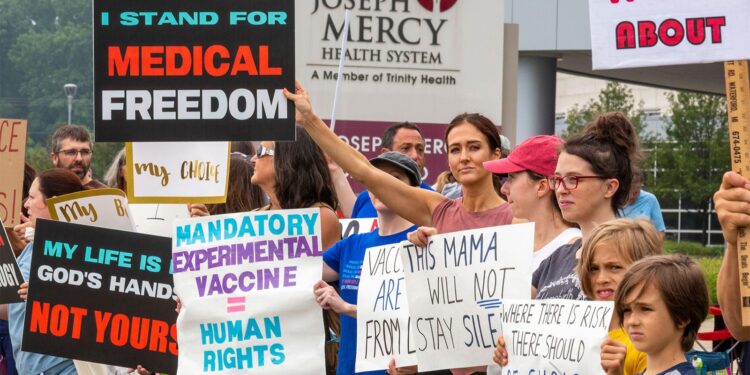The “medical freedom” movement that has gained traction in the U.S. since the COVID-19 pandemic could continue to push public health statistics in a troubling direction, experts told MedPage Today.
They were in part reacting to a recent New York Times story about how vaccine skeptics and others in the “medical freedom” movement are having more influence on American politics.
Indeed, in recent years, childhood vaccination rates have declined, while exemption rates have gone up, according to KFF. In 2024, the percentage of U.S. kindergartners with an exemption from at least one required vaccine increased to 3.3%, the highest percentage ever noted, according to the CDC. There also were more than 32,000 cases of pertussis, surpassing pre-pandemic levels, and there were 16 measles outbreaks totaling 284 cases, up from 4 outbreaks with 59 cases the year prior, CDC said.
Experts are concerned those figures may only get worse as the movement picks up speed, especially in a politically charged climate.
Why Is ‘Medical Freedom’ on the Rise?
Timothy Caulfield, professor of health law and science policy at the University Alberta in Canada, said the medical freedom movement “has been around for a long time, but is kind of coalescing, now, around this phrase.”
That’s in part due to growing distrust when it comes to healthcare and scientific institutions, he said, which is driven largely by the spread of misinformation, including about vaccines.
“In the past, you didn’t hear anti-vax rhetoric be such an explicit part of political platforms,” Caulfield said. “You didn’t hear the advocacy of unproven supplements as being part of political platforms. And now they are, and that signals to people that these beliefs are ideological flags. … These are the kinds of things that you should embrace.”
It has become a “political identity [and] there’s this basket of beliefs that go with it,” he said, including “more access to supplements, access to unproven stem cell therapies, not being required to use other kinds of public health measures.”
However, much of this is “informed by misinformation or misleading marketing,” he said, and “isn’t always supported by the best available evidence.”
It’s not surprising that the COVID pandemic accelerated the movement, experts said.
Paul Offit, MD, of Children’s Hospital of Philadelphia, noted that in difficult events throughout history, people have tended “to look for another reason, some unifying reason, other than just what is usually the reason, which is the random horribleness of life … over which you have no control.”
In the early days of the pandemic, when there were no other treatments, people looked for drugs that would help keep them out of the hospital, and they settled on the anti-malarial hydroxychloroquine and the anti-parasitic ivermectin, Offit said. But even after studies showed the drugs’ lack of effectiveness against COVID, “people still didn’t want to believe it, and it went to the highest level.”
Additionally, when businesses and schools were closed “because we didn’t have anything in 2020,” and travel was restricted, and people were isolated, quarantined, masked, and tested, this was “seen as massive government overreach,” he said. The same was true of vaccine mandates for activities like entering restaurants, sporting events, or places of worship — even though, in 2021, people were 12 times more likely to be hospitalized if they didn’t receive a vaccine, he said.
The movement itself is full of contradictions like that, Caulfield said. It often pushes back on big pharmaceutical companies, but the supplement industry also is worth billions of dollars, with some of the players actually owned by pharmaceutical companies.
And Offit noted that the idea of medical freedom doesn’t apply evenly across medicine. For instance, someone in need of a gallbladder operation isn’t likely to go on the internet and then tell their surgeon how to perform their procedure, he said.
Protecting Public Health
Caulfield said it’s “going to get much more difficult” to address public health threats related to the medical freedom movement going forward. Even just the word “misinformation” has become politicized, he said.
“If there’s a very strong anti-science, don’t-trust-conventional-sources-of-knowledge-anymore phenomenon,” that can do generational harm, he said.
Before a measles vaccine became available in 1963, about 400 to 500 people died from it each year and some 48,000 people were hospitalized. About 1,000 developed encephalitis, or swelling of the brain that can lead to permanent damage, Offit noted.
“We don’t fear it anymore because we don’t remember,” Offit said of vaccine-preventable illness. “And so what gets our attention again, I think, is that children will, once again, have to suffer and die. I really do think that’s what it will take. And then the question is, how many, and I don’t know.”
Source link : https://www.medpagetoday.com/special-reports/features/113726
Author :
Publish date : 2025-01-10 16:43:47
Copyright for syndicated content belongs to the linked Source.


![author['full_name']](https://newshealth.biz/wp-content/uploads/2025/01/Growing-Medical-Freedom-Movement-Poses-Challenge-for-Public-Health.jpg)












